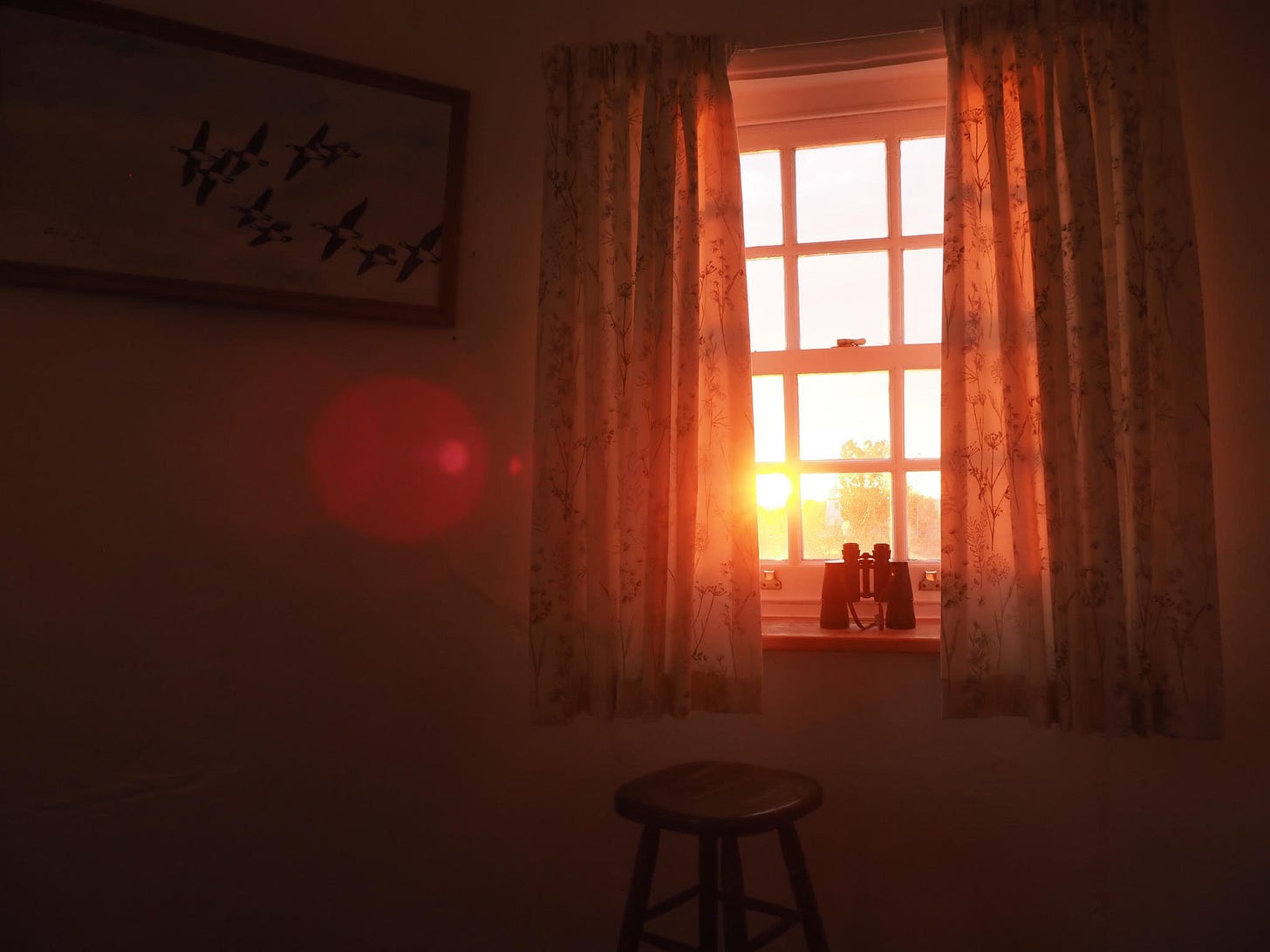#18: The lemon doesn't fall far from the tree
Things my mum's dementia has taught me about my mind
Hey friends,
The last week has been pretty hot and heavy, but the weather has finally cooled off and given me some energy to write (26°C as opposed to 45°C!). I find it much more challenging when it's that hot. My mind just wants to drift off into hazy, lazy places.
Incidentally, that’s pretty much the opposite of where I've ended up going today, but some things just seem to want to be written about, even if they're not always the “happiest” topics. And given that my first post about being a long-distance carer for my mum with Alzheimer’s went down pretty well, I figured I'd write another.
This one is all about things that I’ve learned from being a long-distance carer that have helped me grow as a person. How curiosity has been my main tool for turning lemons into lemonade, and how, despite the ongoing challenges, I've managed to become happier, healthier, and more resilient. It's a pretty personal piece but I'm sharing it with the hope that some of these hard-earned insights may benefit you as much as they have me.
A quick disclaimer: I’m not an expert, nor a psychologist or a neurologist, just someone with an active interest and a habit of going down endless Internet rabbit holes and trying to join the dots to make sense of the/my world.
Silver linings and traffic lights
The truth is, while there aren't many silver linings to this dementia journey, I've been gifted a fascinating insight into the human mind. Given that my main experience of Alzheimer’s has been a voice interaction over the phone over several years, I've been a solely auditory witness to a unique mental (d)evolution.
Of course, caregiving without physical interaction has its challenges - and its limitations. But I’m grateful that it’s allowed me to both show up and help my family and my mum, and to keep my connection with her alive, despite being on the other side of the world.
Another gift has been the toolbox of coping and communication techniques I've learned from spending all those hours on the phone. Things like how to approach our interactions with curiosity and an open mind, rather than dread and sadness and guilt and anxiety (although of course, I've experienced all of the above too).
And so, I thought today I'd share some of these insights, including the traffic light system I use in all my conversations with my mum.

The human mind
I feel like I can’t start any conversation about the human mind, though, without first acknowledging how incredible it is. We’re not physically stronger, faster, or better at reproducing than any other creature, but the way we can process information, harness our intelligence, and hold the concepts of past, present, and future at the same time have all helped us evolve into being the dominant species on the planet.
Still, as much as we've learned about everything else on our planet (and our universe), it's fascinating how much we're still learning about the minds that have got us here.
Recently, there has been a lot of fear-mongering about AI and machine learning. So much so, almost, that it's easy to forget our conscious minds are also incredible learning machines - ones trained to constantly scan for and respond to different stimuli and adapt and grow.
It might not always feel like it (especially before your morning coffee), but the human mind thrives on challenges. Without challenges, our minds can atrophy to the point that the Alzheimer’s Association recommends learning as an effective way for many people to stave off dementia.

In my mum’s case, though, I’m not sure this made a difference. She was a highly successful paediatric occupational therapist who was still working full-time before she went downhill. However, although she loved photography and travelled to some amazing places like the Galapagos, the Amazon, and Kenya to join photography workshops, she could never quite get the hang of pulling photos off her SD card and putting them onto her computer.
Looking back now, that was the first sign. That and accusing everyone of withholding information from her.
As much as she would've hated to admit it, she was an anxious person who liked to be in control. She didn't like feeling like everyone else was organising her life without consulting her - even if those plans had been on the kitchen calendar and in her diary for months. Because she couldn't remember discussing them, she felt blindsided and accused everyone else of purposely keeping her out of the loop and intentionally making her look/feel bad.
As a fellow anxious person, I see a lot of these similar traits in me. This is perhaps unsurprising as the majority of our subconscious mind is formed in childhood (aged 0-7), and we usually pick up a lot of our subconscious programming from our primary caregiver. In my case, this was my mum.
While studies have shown that these subconscious traits and tendencies can be reprogrammed, this usually requires some sort of active participation, e.g. positive thinking, gratitude lists, journalling, or somatic therapy. It takes time and dedication.
And, as much as my mum tried to help herself in her life, a lot of the subconscious programming that is now her main operating system still stems from her childhood, which wasn’t always a happy one.
Unfortunately/fortunately(?) for me, a lot of that subconscious programming is mirroring my own, which is fun. There’s nothing like coming face to face with your issues and seeing the consequences of not working on them playing out in real-time.
For example, I always used to go straight to the worst-case scenario. I would see this as a way of preparing for the worst (while hoping for the best), but the reality is that a) 99% of the time it was never that bad, and b) if it was I didn’t feel more prepared for it.
As our nervous system doesn’t have eyes and can’t necessarily differentiate between what is real and what is not, I just ended up re-living the worst things twice and making life even harder for myself.
Red lights and Green lights
As humans, we're pre-programmed to lean towards the negative. It’s been an innate survival strategy that has ensured the global dominance of our species, but now most of us don’t have our physical survival threatened daily, it can lead to a whole host of other issues, including anxiety and depression. Both of which are also common in dementia patients.
Having read a lot about how to best communicate with someone with dementia, one of my favourite findings is the traffic light system. This is a communication tool to try to prevent tipping them over into that negative place.
First, though, let’s zoom out for a second.
Imagine you've noticed a pretty flower. But, as you leaned in for a closer look, you heard a snake rustling in the bushes. Chances are, you're going to remember that over the flower. Your mind will most likely file the experience under “red” for danger, rather than “green” for positive.
On a more subconscious level, you might now start associating flowers with snakes and danger and therefore stop noticing or appreciating them as much. But, unless you dig in deep, you probably won’t remember why.
For example, after March 2020, flying and airports made me super anxious. It took me forever to put two and two together, but eventually, I realised that my hectic, touch-and-go dash back into Australia just before they closed the borders had resulted in me associating airports and flying with fear and anxiety (red), rather than relief that I did actually make it back (green).

My mum still feels the same anxieties, fears, and body discomforts that we all do, but she doesn’t have that same ability to flick back through the memories and understand what it is that might be triggering these feelings.
So, if she has a conversation with someone that makes her feel negative or angry or sad or uncomfortable or frustrated, then even though she'll probably soon forget what the conversation was about or who it was with - or even that she had a conversation at all - she would still feel that discomfort and have nothing to attribute it to.
Instead, she’ll scan what she can remember/see/feel to try to find something to explain her discomfort. At the moment, her go-to is often a physical sensation of something being “wrong” (pain), physical discomfort with her clothes or shoes, or that she’s lonely and no one loves her or cares about her, because if they did, she wouldn’t be feeling like this.
Using the traffic light analogy helps me avoid the “danger” zone and helps me focus on keeping our conversations “green” or “amber” (neutral).
In real-world terms, this means avoiding hard or complicated topics, not questioning her version of events or reality (something I still struggle with, but have learned to do better), and not baby-talking or treating her like a child.
And so, every time I pick up the phone, I take a deep breath and try to put on a cheery voice, hide my own emotions or frustrations, and not project anything onto her that she might pick up as being “off” and read into.

While I’m far from a psychologist, my current perception of the way we process information is that we take it in through our eight physical senses and then run it through our mind to help us make sense of what we’re processing, a bit like a computer reading a program.
In our case, though, our mind computer is made up of things like memories, perceptions, emotions, experiences, beliefs, and subconscious programs. This is what we think of as our “self”.
However, if this mind machine doesn’t work as it should for whatever reason (dementia or something else), the whole system falls apart. It becomes much harder to make sense of those stimuli and understand what it is we’re feeling/seeing/experiencing, etc, especially if something feels “off”.
Like a computer trying to run a fragmented program or a CD player trying to play a scratched disk, our minds will still search for an answer. After scanning for a while or skipping over the scratches, they might conclude that it must be physical pain or something in their environment because they can’t attribute it to anything else. It may not make sense outside of the mind, but the mind feels like it's done its job.
This also applies to me, right now. This post may be entirely unscientific and just be me making a big stretch; taking my perceptions, experiences, and things I've read and learned, and trying to combine them in a way that makes sense to me.
It may not make sense to anyone else, but it helps me understand my mum - and myself - and show up for both of us a little better, so on my end, it feels like a success.

The truth is, that re-meeting my mum every time we talk has massively expanded my definition of consciousness beyond who I am or who she is. It's shown me that there’s so much more going on that we don’t see.
For example, my conscious (anxious) mind, the thing I think of as myself - and the one that has been leading me up the garden path with all those anxious feelings I mentioned earlier, is not actually me. Or is perhaps more accurately described as just a tiny part of me.
Letting go of this idea of it being me has helped me immensely. It’s helped me take a far more nuanced, zoomed-out approach to the realities of who we are.
It’s helped me become more curious and open-minded about why I’m so anxious, or why I feel certain things. That alone has changed everything, including helping me understand and override those pesky programmed “danger” warnings about snakes and flying.
Best of all, though, it's helped me show up better for my mum and myself. Despite how tough things still are, I’m in a more healthy, happy, and resilient mental place than I've ever been, and I'm infinitely grateful for that.
I'm also grateful for how our globalised society means that I not only get to show up for my mum on the phone from the other side of the planet, but I also get to share these hard-learned tools with all of you and my writing workshop/mentoring students, too.
The idea that I get to use all my not-so-great experiences to help others navigate tough times is a real guiding light for me when things get tough (sorry, not sorry for the lighthouse pun… I had to!)
Here’s hoping you have a wonderful week ahead.
Love always,
Cassie x

If you’ve enjoyed this post or have found it insightful, I’d love it if you could like it, leave a comment, or share it with a friend. If you’d like to read more, feel free to let me know topics you’d like me to cover and/or subscribe for future updates.



